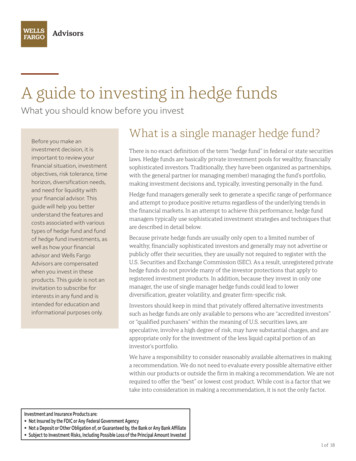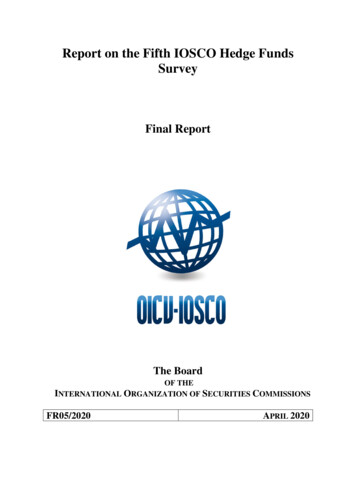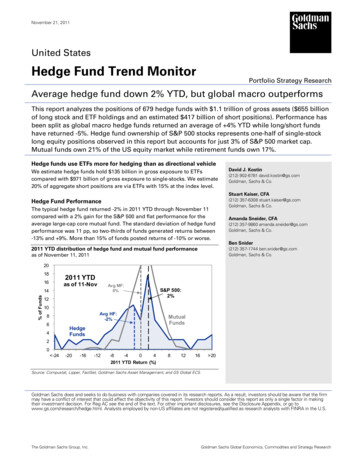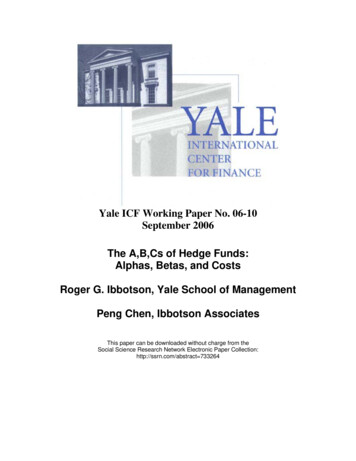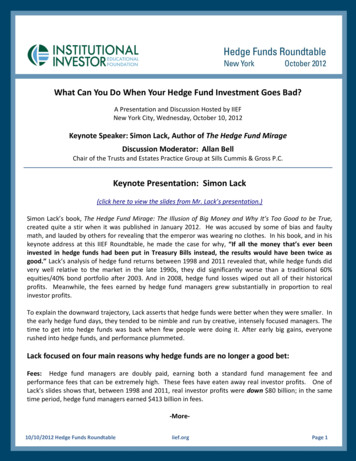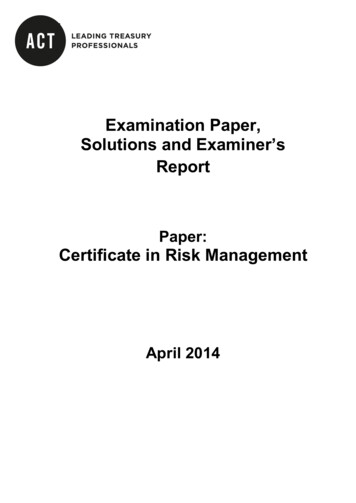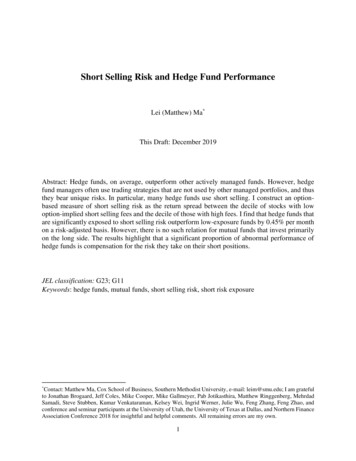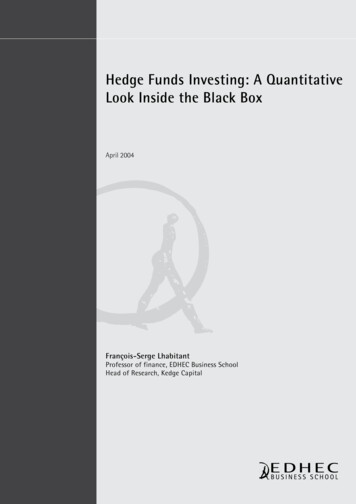
Transcription
HEDGE FUNDS 101CONTACTS:Tel: 27 (0) 21 914 7730Fax: 27 (0) 21 914 7733OFFICE:Third Floor, The CliffsOffice Block 1, Niagara Way,Tyger Falls, 7530FIND US HERE:www.novare.comretaildistribution@novare.com
01CONTENTSI N T R O D U C T I O N. . . . . . . . . . . . . . . . . . . . . . . . . . . . . .2HED GE FUND MYTHS BUSTED . . . . . . . 1 0WH A T I S A H E D G E FU ND. . . . . . . . . . . . . . . .3THE SOUTH AFRICAN HED GEFUND IND USTRY. . . . . . . . 1 3T HE E V O LU T I ON OF S OUTHA F R I C AN H E D G E FU NDS . . . . . . . . . . . . . . . . . .4H O W D OE S A HE DG E FU NDDI F F E R F R O M A U N IT TR US T? . . . . . . . . .5DER I V AT I V E S A N D LE VE R A G E . . . . . . . . .6ABOUT US. . . . . . . 1 4WHY YOU SHOULD CONSID ERINCLUD ING HED GE FUND SIN YOUR PORTFOLIO?. . . . . . . . 1 4THE BENEFITS OF MULTIMANAGER FUND S. . . . . . . . 1 5S HOR T A N D LON G POS ITION S . . . . . . . .7P ROD UCT OFFERING . . . . . . . . 1 6DI F F E R E N T ST RA TE G IE S . . . . . . . . . . . . . . . . . .8AWARD S. . . . . . . . . 1 8OB J E C T I V E S OF H E DG E FUN DS . . . . . . .9CONTACT US . . . . . . . 1 9B ENE F I T S OF H E DG E FUN DS . . . . . . . . . .9
02INTRODUCTIONDespite the misconception that hedge funds are risky investments, South African-based funds are in fact relativelyconservative. Interestingly, many South African investors stillperceive hedge funds as the riskier investment when compared tounit trusts when, in fact, the two vehicles are very similar.In 2015 National Treasury and the Financial Services Boardreleased the final regulation of hedge fund portfolios afteran extensive consultative process with the local industry. Thenew regulation would regulate hedge funds under the existingCollective Investment Schemes Control Act, No. 45 of 2002 (CISCA),which also encompasses the well-known unit trust industry.Because most South African hedge funds operate as pooledinvestment vehicles, government’s proposal to subject them tothe rules that apply to other collective investment schemes madesense.All the money invested in a hedge fund goes into a pool, witha fund manager deciding which assets to invest in - as is thecase with the unit trusts that represent the majority of people’ssavings and/or investments, fund managers for the most part investin stocks or bonds. However, hedge funds have other tools at theirdisposal that unit trusts do not. Probably the most significant ofthese is that hedge funds are able to make money on an asset evenif it declines in value.In addition, there are many different hedge fund styles to suit themany different personalities and goals of investors. Each fundmanager has a different mandate, covering the entire spectrumfrom very risky to very conservative.In an environment where traditional approaches to investmentshave underperformed, the advantages that hedge funds offer canno longer be ignored in a well-balanced portfolio. The recent flurryof financial market events and persistently challenging globaleconomic conditions have meant that even large portfolios acrossvarious markets and industries have struggled to generate returnsin excess of inflation.
03W HAT IS A H ED G E F U ND ?Hedge funds form part of alternative investments, whereas other more traditional and more familiar investment vehicles/ strategies formpart of traditional ITYBONDSHEDGEFUNDSCASHHedge Funds aim to achieve positive returns at a reduced level ofrisk. Characteristics making hedge funds unique includes the useof: derivatives, short selling, leveraging.ALTERNATIVEINVESTMENTSVSThis enables hedge funds to extract positive performance in bothupward or downward trending financial markets. Hedge fundstend to have low correlations to traditional portfolios of stocksand bonds, therefore, allocating an exposure to hedge funds canbe a good diversifier.Although hedge funds invest in the same asset classes astraditional unit trust funds, it can take advantage of a wide rangeof price adjustments and thereby generate other sources ofreturn.COLLECTABLESfor example: er the new regulation, CISCA classifies hedge funds into twocategories- retail investor funds (RIHF) which have more stringentregulation requirements, and qualified investor hedge funds(QIHF).A Qualified investor, as defined by the Financial Services Board(FSB) Board Notice 52 of 2015, is:any person who invests a minimum investment amount of R1million per hedge fund and who –(a) has demonstrable knowledge and experience in financial andbusiness matters which would enable the investor to assessthe merits and risks of a hedge fund, or(b) has appointed a Financial Services Provider (FSP) who hasdemonstrable knowledge and experience to advise theinvestor regarding the merits and risks of a hedge fundinvestment.A retail investor hedge fund is defined as a hedge fund in whichany investor may invest because it meets the requirements setout by the FSB.
04SOME OF THE OTHER CHARACTERISTICS ARETABULATED BELOW:R E TA I L I N VE S T O R HED GE F UN D SQ UA LI F I ED I N V ES TO R HED GE FUNDSInvestorsAvailable to general public (varying minimums)Only available to qualified investors ( R1,000,000)Gross exposure limitVAR limit 200% 20%Not definedDisclosure to clientsMonthlyQuarterlyMax equity holdings 10%Not definedInvestor liquidityCalendar month90 daysRisk managementDailyDailyMarketingAble to solicit investments from all investors.Only accept investments from a restrictedpool of qualified investors.Not definedT HE E V O L U T I O N O F S O U T H AFR ICANH E D GE F U N DSFirst South African single managerhedge fund established.FSB starts regulating hedge fundmanagers, requiring that theyhold a CAT II A licence.199520071949Alfred WinslowJones coinsthe term ‘hedgefund’.2003First fund of hedgefunds created.The FSB and National Treasuryembarked on a process to enhanceand expand the scope of regulationand oversight over hedge funds. Aproposed framework for regulatinghedge funds in South Africa wasreleased and after engagement withindustry, draft regulation for publiccomment was released in April 2014.20122011Introduction of Regulation28 for pension funds whichintroduced a 10% investmentallocation limit to hedgefunds. Previously theregulation did not explicitlyrefer to hedge funds.2015National Treasury and FSBfinalises regulation of hedgefunds. Hedge funds areregulated under the existingCollective InvestmentSchemes Control Act, No. 45of 2002 (CISCA).
05HOW DOES A HEDGE FUND DIFFERFROM A UNIT TRUST?The major difference between a unit trust and retail hedge fundis that unit trusts can only buy financial instruments. This meansthat investors only make money if the value of those instrumentsincrease in value. With a hedge fund, they still invest in the sameinstrument, but the managers have a lot more tools at theirdisposal to protect capital. They could, for example, buy and sellfinancial assets and use leverage to enhance returns.It is important that investors should note that hedge funds arenot for short term investing. They need to take at least a three tofive year, and ideally longer, view.As mentioned, hedge fund invest in the same securities asunit trusts, they just have more ways of protecting assets anddelivering positive returns irrespective of market ERAGEUNITTRUSTHEDGEFUNDASSETS: equities, bonds, cash, etc.Bi-directional investment strategy; Short assetexposure can be obtained through:ASSETS: equities, bonds, cash, etc.“Buy & hold” investment strategyThe underlying assets in a UnitTrust fund are made up of: cash or money market instruments, shares, gold bullion, listed property, borrowing script, short sellingderivatives, e.g. buying put options,selling futuresHedge funds are made up of the same assets, but have awide range of tools available to use in order to optimise theseassets, such as: derivatives,listed offshore shares, short selling, local government bonds Leveraging etc. equity derivative products are used to protect thedownside.
06DERIVATIVES AND LEVERAGEDERIVATIVESLEVERAGEA derivative is a contract between two or more parties.A security where price is dependent upon or derived from oneor more underlying assets.Leverage is the practice of using borrowed money to generatevvia return on an investment.Its value is determined by fluctuations in the underlying asset.It can be defined as borrowing funds to make the investment.vviThis gives the hedge fund manager opportunity to control bigvvipositions with little outlay, this is called buying on margin.The most common underlying assets include stocks, bonds,commodities, currencies, interest rates and market indexes.Leverage is popularly used in derivative instruments, i.e.vvioptions, put, calls, etc.Leverage can magnify both gains and losses.OPTION 1R10 000FOR SALER30 000John buys a house for R20 000 and later sells it for R30 000.Meaning John has made a profit of R10 000.01R20 000R40 000OPTION 2FOR SALER30 00001FOR SALER30 00002FOR SALER30 000FOR SALER30 000John uses the R20 000 and splits it into4 x R5 000 down payments on four differenthouses (each valued at R20 000). The restof the money needed for each house, heborrows.He later sells each property at R30 000.0304John has made a profit of R10 000 on eachhouse he sold. Meaning his total profit isR40 000 (vs R10 000 in option 1).R5 000“R5 000R5 000R5 000That’s a return of 200%.IN THE SAME WAY, INVESTORS LEVERAGE DERIVATIVES IN ORDER TO GENERATE RETURNS.
07SHORT AND LONG POSITIONS1The short-seller (Peter) BORROWS an asset (golf club)from John and agrees to return it at a later stage.2The short-seller (Peter) thenSELLS the asset (golf club)to someone else.3The short-seller (Peter)then BUYS a new asset(golf club) from themarket (at a cheaper priceto what he sold it at).4FeeThe short-seller (Peter)RETURNS the asset(golf club) to John andpays him a small fee forthe loan.SHORT POSITIONLONG POSITIONThe sale of a borrowed security, commodity or currency with theexpectation that the asset will fall in value.The buying of a security such as a stock, commodity or currency,with the expectation that the asset will rise in value.For example, if a manager borrows and sells Stock Mabone, itis said to be “short Mabone” or “has a short position in StockMabone”For example, an owner of shares in Stock Water is said to be“long Water” or “has a long position in Stock Water”EXAMPLEEXAMPLEBorrows 10 Mabone shares and sells on the open market @ R100per share (with the expectation that the asset will fall in value).Buy 10 Water shares @ R100 per share (with the expectation thatthe asset will rise in value).Share price declines to R75 per share Portfolio Value R75 x 10 R750Total Investment R100 x 10 R1000 Share price rises to R135per share Portfolio Value R135 x 10 R1350Profit (when buying back) R1000 – R750 R250 / R25 per shareProfit (when selling) R1350 – R1000 R350 / R35 per share
08DIFFERENT TYPES OF STRATEGIESEQUITY LONG/SHORTFunds aim to generate positive returns by being simultaneously long and short in the equity market. Market risk isreduced while company-specific risk is retained. The majority of local equity long/short funds tend to be long-biased.An investing strategy of taking long positions in stocks that are expected to appreciate and short positions in stocks thatare expected to decline. A long/short equity strategy seeks to minimise market exposure while profiting from stock gainsin the long positions and price declines in the short positions.EQUITY MARKET NEUTRALFunds take similar sized long and short positions in related equity sectors with the effect that directional marketrisk is offset. A strategy undertaken by a manager that seeks to profit from both increasing and decreasing prices.Market-neutral strategies are often attained by taking matching long and short positions in different stocks to benefitfrom mispricing and delivering positive returns from both the long and short stock selections and reducing risk frommovements in the broad market.FIXED INCOME ARBITRAGEAn investment strategy that attempts to profit from arbitrage opportunities in interest rate securities. When using afixed-income arbitrage strategy, the investor assumes opposing positions in the market to take advantage of small pricediscrepancies while limiting interest rate risk.This general strategy type includes basis (e.g. cash vs. futures), yield curve and credit spread trading, as well as volatilityarbitrage.STATISTICAL ARBITRAGEQuantitative models are used to identify market opportunities and establish short-term positions involving a largenumber of securities.VOLATILITY ARBITRAGEFunds aim to exploit mispricing between similar instruments where the mispricing is the result of different volatilityassumptions by price makers.MULTI-STRATEGYAn investment philosophy allocating investment capital to a variety of investment strategies and potentially acrossseveral asset classes.COMMODITIESFunds that predominantly invest in soft or hard commodities. These funds can follow a number of different strategies toobtain alpha from this asset class, including trend following or non-directional market neutral strategies.
09OBJECTIVES OF HEDGE FUNDSHedging limits the probability of a loss from fluctuations in the price of securities, as well as: Reduce market risk Reduce return volatility Preserve capital Enhance returnsBENEFITS OF HEDGE FUNDSHedge fund managers take calculated risk as would any fund manager but the extent of the draw-down in negative markets is less, sothe recovery is quicker. Hedge funds can take advantage of a wide range of price adjustments and thereby generate other sources ofreturn. Other benefits include:Hedge funds can take advantage of both rising and falling financial marketsAdding a portion of one’s assets to hedge fund investments can complement a well-diversified portfolio bylowering the overall volatility, but maintain the return profile.Hedge funds can assist in capital protectionIn the current environment, a low-risk investment such as hedge funds can protect capital while delivering theexpected returns. Due to lower return volatility, these funds don’t participate in the full extent of asset classdrawdowns as experienced in both the local equity and bond market and therefore assist in capital protection.Hedge fund managers have more investment tools at their disposalHedge funds invest in the same instruments available to traditional long-only asset managers, the maindifference being that hedge fund managers have more investment tools at their disposal like shorting andleverage to express their view on the market, resulting in an ability to generate an alternative source of returnrelative to traditional investments.Funds of hedge funds take the legwork and risk out of investing in hedge fundsFunds of hedge funds help investors to protect their total portfolios against severe market downturns sothat investments can compound at a stable rate. The advantages of funds of hedge funds include automaticdiversification, monitoring efficiency and selection expertise.Funds of hedge funds ensures instant diversificationFund of funds enable an investor to obtain instant diversification in a portfolio of hedge funds, which isparticularly attractive for an investor with a portfolio that is large enough to invest in hedge funds, but too smallto achieve proper diversification going directly into hedge funds.
10HEDGE FUND MYTHS BUSTEDVS.PERCEPTIONREALITYAccording to the Alternative Investment Management Association (AIMA), proof points that contradict common hedge funds myths are oftenoverlooked due to the historic nature of hedge funds keeping a low profile and gaining publicity on the odd occasion when a blow-up or fraudcase causes news headlines.MYTH #1HEDGE FUNDS AREN’T REGULATED AND THE INDUSTRYIS SECRETIVE AND MYSTERIOUSHedge fund specific regulation may have only come into effectrecently, however, hedge fund asset managers have been regulatedunder the Financial Advisory and Intermediary Services Act (FAIS)since October 2007 under a separate license category, CATIIA.(Discretionary asset managers such as unit trust asset managersrequire a CATII licence.)In 2015, Hedge funds were included under the regulation of the localCollective Investment Schemes Control Act also known as CISCA.Under the new regulation, hedge funds will be more accessible to abroader investor base.Most hedge funds in South Africa operate as collective investments,hence the decision for hedge fund regulation to be in line withexisting collective investment regulation. To address the regulationof the hedge fund product, the Financial Services Board (FSB)together with National Treasury and industry players embarked ona consultative process to understand the South African hedge fundlandscape and compile suitable regulation, which saw hedge fundsbeing regulated under CISCA. CISCA also regulates the well-knownunit trust industry.MYTH #2HEDGE FUNDS ARE RISKY INVESTMENTSAlthough hedge funds invest in the same asset classes as traditionalunit trust funds, the difference is that it can take advantage of awide range of investment tools and thereby generate other sourcesof return. Hedge funds tend to have low correlations to traditionalportfolios of stocks and bonds, therefore, allocating an exposure tohedge funds can be a good diversifier.Contrary to popular belief, this strategy aims to achieve positivereturns at a reduced level of risk. Characteristics making hedge funds unique includes the use of derivatives, short selling, leveraging etc. tobe able to extract positive performance in both upward or downwardtrending financial markets.One of the main objectives of the regulation by National Treasuryis the monitoring and measuring of systemic risk while enhancingproduct requirements to protect investor interest.
MYTH#3 HEDGE FUNDS CHARGE HIGH FEES According to the 2016 Novare Hedge Fund Survey results, a decreasein annual management fees has been seen, combined with fundsemploying a higher hurdle rate for performance fees. Fees havealways remained topical and the hedge fund industry has not beenexempt. For the first time, under the new regulation, retail hedgefunds will have to disclose their Total Expense Ratio (TER) to thepublic. More than two-thirds (66.3%) of the funds charge an annualmanagement fee of 1.0%, up from 58.1% the previous period, this hasbeen as a result of those charging higher fees decreasing their rates.11The local hedge fund industry does not follow the typical 2.0%Annual Management Fee (AMF) and 20.0% performance fee ratio.Instead, a 1.0% AMF and 20.0% performance fee ratio is the popularcharge. More than two-thirds (66.3%) of the funds charge an annualmanagement fee of 1.0%, up from 62.0% the previous period.A migration to lower charges has been observed, with those charging1.5% decreasing from 23.9% to 15.3%, this has been driven by twomain asset managers who previously had that fee structure.MYTH #4HEDGE FUNDS PRODUCE BIG SWINGS INPERFORMANCEAs with any investment, time is your best friend and marketmovements and subsequent volatility will continue to have an effecton investments, no matter the strategy. Hedge fund managers takecalculated risk as would any fund manager. But, the extent of thedraw-down in negative markets is less and therefore, the recovery isquicker.The advantage of hedge fund managers having more investmenttools at their disposal is that they can take advantage of both risingand falling markets and profit from rising or falling financial markets,thereby providing capital protection.According to the survey, the industry has experienced uninterruptedand tremendous growth in assets of 118.3% over the past five years.Solid performance remained the main driver of asset growth asinvestors were seen rewarding managers that had good returns byincreasing their allocation - a reflection of the growth and stability oflocal hedge funds when it comes to size.MYTH #5HEDGE FUNDS ARE ONLY FOR THE RICHOR BIG CORPORATESUnder the new regulation, hedge funds will be more accessible to abroader investor base and have been classified into two categoriesretail investor funds (RIHF) which have more stringent regulationrequirements, and qualified investor hedge funds (QIHF). Retailhedge funds are available to the general public, whereas it is onlyqualified hedge funds that are suited to the savvy investor andcorporate investor.A retail investor hedge fund is defined as a hedge fund in which anyinvestor may invest because it meets the requirements set out by theFSB.From 2011, investors could also allocate up to 10% of their pensionfund contributions to hedge funds after the Regulation 28 of thePension Funds Act (Act 24 of 1956) was amended to include this hedgefund exposure limit.
12MYTH #6HEDGE FUNDS MAKE USE OF EXOTICASSETS AND INVESTMENT STRATEGIES THATAREN’T WELL KNOWNHedge fund invest in the same securities as unit trusts, the differenceis that it has more ways of protecting assets and delivering positivereturns irrespective of market direction.Take a unit trust for example. The underlying assets in a unit trustfund are made up of cash or money market instruments, shares,gold bullion, listed property, listed offshore shares, local government?bonds and some use of equity derivative products are used toprotect the downside.Hedge funds are made up of the same assets but have a wider rangeof tools available to use in order to optimise these assets, such asderivatives, short selling, leveraging etc.MYTH #7HEDGE FUNDS ARE MANAGED BYFLY-BY-NIGHT MANAGERSAccording to the 2016 Novare Hedge Fund Survey findings, 73.2%of industry assets are managed by hedge fund asset managerswith experience in hedge funds exceeding eight years. It should behighlighted, that in addition to the aforementioned eight (and more)years of hedge fund specific experience, this does not take intoaccount the years spent in the financial services industry workingwith traditional funds, prior to their move into the hedge fundspecific investment space. Hedge fund managers have an immenseunderstanding and vast years of experience within the financialservices industry.MYTH #8HEDGE FUNDS ARE MANAGED BY SMALLAND UNKNOWN ASSET MANAGERSAlthough the perception may be that hedge funds are managed byniche, boutique investment houses, the reality is that hedge fundsform part of most of South Africa’s largest financial service provider’soffering. Hedge funds’ assets are not the only assets managed byhedge fund managers, and most form part of a well-diversified assetmanagement business managing a multitude of investment offerings.According to the survey, the lion share of assets are still beingmanaged by asset managers that manage total assets exceeding R2billion (translating into 85.7% of hedge fund assets being managedby these asset managers). Similar to the findings of previous years,the bulk of hedge fund assets are managed by asset managers thatmanage between R10 million and R100 billion (38.5% of hedge fundassets).We are seeing asset managers maturing and hedge fund businessesbecoming more mainstream. Managers have raised businessassets and have diversified their income stream by adding otherproduct offerings. We now see a healthy business mix that is robust,alleviating some of the business concentration risks.
13THE SOUTH AFRICAN HEDGE FUNDINDUSTRYStrong growth was experienced during the measured period withassets increasing by 10.5% - despite the exclusion of structuredfinance which represented 1.3% of assets last year.The industry experienced little new inflows and most of thegrowth can be attributed to solid performance. According toAUM, most of the inflows were to equity market neutral funds.Most net outflows were experienced by funds that had a poorperformance over the period. Equity market neutral fundsattracted net inflows (with most funds experiencing solidresults), this is due to the increased appetite in the strategy giventhe choppy sideway market in the measured period.The industry has experienced uninterrupted and tremendousgrowth in assets of 118.3% over the past five years. Solidperformance remained the main driver of asset growth aswe saw investors rewarding managers that had good returnsby increasing their allocation. A reflection of the growth andstability of local hedge funds when it comes to size.KEY ROLEPLAYERSPortfolio ManagerFund AdministratorsDetermines strategy and is invested in the fundA service provider whose main job includes providingcertain accounting and back office services to a hedgefundPrime BrokerThe prime broker provides a consolidation service,including services such as custody of the securities,loaning of securities for short sales, providing marginfinancing, and providing back office technology andreporting.AuditorsEnsure fund compliance; verify financial statements asrequired by law
14ABOUT USFounded in 2000, Novare is one of South Africa’s leadingfinancial services groups. We initially began our journey as anindependent advisory business offering tailored financial advice.A year later, in 2001, we entered the multi-manager industry byproviding multi-manager and alternative investment solutions toour retail and institutional clients.Our bespoke approach has enabled us to consistently identifyand blend leading fund managers into a single portfolio, allowingus to craft and maintain some of the best funds on the market.Our in-depth and rigorous research process is committed tounderstanding how each fund manager contributes to an overallfund structure. This approach, combined with strategic assetallocation and ongoing fund manager monitoring is what leads tosuperior performance.Our proven 16-year track record and strong balance sheet enableus to offer our clients a wide variety of unique, well-researchedinvestment options, including investment advice, assetmanagement, investment consulting, alternative investmentsand private equity. This includes being the first investment firmto launch regulated hedge funds to the South African retailmarket.WHY YOU SHOULD CONSIDER INCLUDING A FUND OFHEDGE FUNDS IN YOUR PORTFOLIO?In today’s volatile market you need a comprehensive, nimbleand diverse investment portfolio that can provide alternativeopportunities to maximise returns whilst minimising risk. Byinvesting in Novare’s award-winning range of fund of hedgefunds, you have access to a variety of unique financial productsand markets not typically available to individuals. In addition,you benefit from:investment team to ensure optimal fund structures andperformance at all times. Due to the uncorrelated returns of hedge funds to traditionalasset classes, an allocation in a well-diversified portfolio willdecrease portfolio volatility and enhance the overall risk/returnprofile. Including South Africa’s leading hedge funds in your portfolio.These funds are continuously monitored by our expert An improvement in downside protection, reducing lossesduring sharp market sell-offs.
15THE BENEFITS OF MULTI-MANAGER FUNDSWe believe that a multi-manager approach to investing isone of the most successful ways of optimising risk-adjustedreturns. Markets are characteristically inefficient, but we havethe ability to take advantage of this by investing across variousmanager styles and asset classes to deliver diversified and realinvestment outcomes.Multi-manager funds combine multiple professionally-managedinvestment funds into a single offering. This provides a numberof benefits that are typically difficult to achieve when investing insingle-manager funds:Asset class diversification: Multi-manager funds invest acrossdifferent asset classes, sectors and geographies. This type ofdiversification minimises the dependence on the performance ofa single fund manager and enables you to benefit from reducedrisk without sacrificing returns.Fund manager diversification: By broadening your investmenthorizon beyond a single fund manager, your exposure to theperformance and management style of that fund manager isreduced. No single fund manager can consistently outperformacross all asset classes all the time as each fund manager hasa different area of focus and approach to their investmentphilosophy and process. Multi-managed funds harness thespecialised expertise of several fund managers into onecollaborated fund.Active management: Investing in a multi-manager fundeliminates the need for you to choose where and how to investyour money as the research, selection and ongoing monitoringof each fund manager is done on your behalf by the expert teamat Novare. Multi-manager funds offer diversification in onesingle investment option and removes the pressure of having tofind, as well as monitor, individual fund managers.Specialised skill: A multi-manager approach provides you withaccess to the pooled expertise of multiple investment experts.Each expert is dedicated to understanding how every fundmanager contributes to the overall fund structure. Each fundmanager also looks after their unique area of expertise, allowingeach fund within the fund to operate optimally. Every fund ismonitored to ensure optimal performance and is rebalancedwhen necessary.
16PRODUCT OFFERINGTo grow your wealth and achieve financial security, you needto invest for the future. If you have been delaying investingbecause you don’t know which funds to invest in, multi-managerfunds can help set you on your way. Multi-manager funds offerdiversification in a single investment and remove the pressure ofhaving to find, as well as monitor individual fund managers. Weprovide investors with a selection of multi-manager funds whichcan form part of your medium to long-term investment p
Hedge Fund Survey 2016 Print1.pdf 9 2017/02/14 8:39:57 AM. 08 DIFFERENT TYPES OF STRATEGIES EQUITY LONG/SHORT Funds aim to generate positive returns by being simultaneously long and short in the equity market. Market risk is reduced while company-specific risk is retained. The majority of local equity long/short funds tend to be long-biased.
